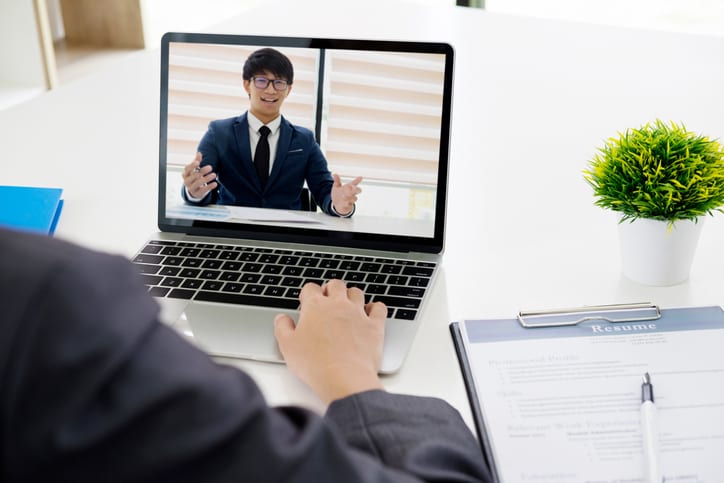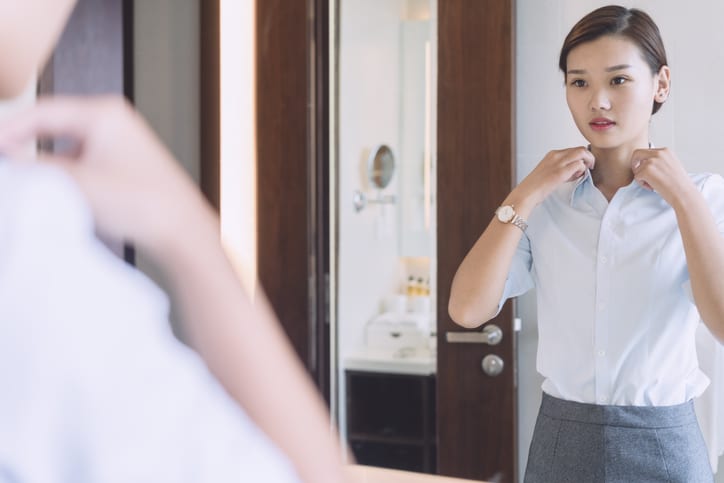In light of the recent pandemic, remote recruiting is suddenly a hot topic. However, with a whole host of technological and communicational factors to consider, video and phone interviews are a little different from the face-to-face conversations we may be used to.
With the help of recruitment and HR experts, we’ve collected together some top tips to help you prepare for what will be, for the time being at least, the new normal when it comes to hiring and recruitment. From the importance of body language to creating the right setting, we’ll show you how to plan for success when it comes to interviews conducted over the phone and through video calls.
How much more important does non-verbal communication, such as body language and facial expressions, become during video interviews?
We’ve talked about the importance of non-verbal communication in interviews before, but with the distance created by remote recruiting things like body language and facial expressions certainly come into focus more. James Didgiunaitis, Director of Expion Search & Selection, notes: “Subtle non-verbal communication such as facial expressions, eye contact and hand gestures can reveal a lot about how you’re feeling. The goal is to give the impression you’re calm, relaxed, and confident. Projecting this sharp image by using positive body language and gestures can go a long way in lending credibility to what you’re saying during the interview.”

Likewise, how we convey messages is crucial too. Hassan Mohammed, Founding Partner at Harrison Forbes Consultancy, states: “Applicants should not underestimate the value and impact of tone of voice. A dull, monotone pitch will not inspire the interviewer and they will quickly lose interest. Facial expressions that exude positivity are particularly crucial too.”
Nerves can get the better of us in job interviews, and our anxieties may be heightened in these new settings. Alice Weightman, CEO and Founder of the Work Crowd and Hanson Search, noted some bad habits to avoid in video call situations: “Don’t fidget, click a pen, cover your face with your hands, look down or to the side continuously. However, do maintain good eye contact, sit up in your chair and use your hands in an appropriate way. It’s good if you can also read the interviewer – it will help you see how engaged they are and keep the interview flowing.”
A good way of approaching your communication is by heeding what Farid Gasanov, Recruitment Expert and Founder of video CV app QFinds, says. Taking a more academic approach, he notes: “Professor Albert Mehrabian came up with the 7%-38%-55% theory: 7% is the actual words you use, 38% is the tone of your delivery, and 55% is the body language used to accompany your words. Ultimately, 55% of any communication is your body language. So, if you communicate your professional demeanour and excitement about the role through this, consider 55% of the interview already in your hands!”

In phone interviews, however, we lose this crucial use of body language, so what can be done to compensate for the lack of it? Farid suggests: “The key is that you should be confident and authentic in your conversation. Your tone and rhythm matter. Even if you smile while speaking, the interviewer will feel that.”
Meanwhile, Alice notes: “You should spend more time listening and making sure you don’t just keep on talking, so make sure you are direct, succinct and answer the question clearly. Think about your tone too – show passion for the role or company by the tone of your voice; no one wants to hear someone drone on monotonously.”
James suggests using the loss of body language to your advantage, stating: “Since you can’t use body language to convey confidence, you can make sure you have plenty of notes and documents to keep you prompted in what you are saying.”
What sort of attire should applicants be wearing? Is there any benefit to wearing formal interview wear even during phone interviews?
“We’ve all had at least one Zoom call when we’ve stayed in our PJ bottoms,” says Farid. Indeed, during these unprecedented times, the way we dress might have taken a bit of a nosedive, but it’s important to remember that video calls are still a professional interview. “In-person interview etiquette still applies during virtual interviews. Trust us, your efforts won’t go unnoticed by the interviewees,” notes Farid.

Don’t be tempted to only suit up your top half, either. As Farid states: “What if you need to stand up at some point; maybe to shut your door or keep your cat out of the room? Or, perhaps the interviewer wants to see that award on your shelf at the back? It’s worth dressing up properly as if you’re going for the real interview. Believe us, it’ll make you feel more confident too.”
Indeed, a boost of confidence is just what you need in an interview. James pointed to a recent interview he read featuring Dawn Karen, a fashion psychologist. In the interview, she pointed to a theory she had called “mood enhancement dress”, i.e. dressing to optimise your mood. Quoting Dawn, James noted: “When you desire to get out of a funk, dressing up or practising mood enhancement dress would be proven most beneficial.”
Nick Derham, recruitment agency owner at Adria, echoes these sentiments: “Dressing smart simply gets you mentally prepared for the interview. Always avoid wearing checks or stripes, as they produce a distracting moiré effect, while candidates should stay away from any noisy fabrics, too.”
If you don’t know what to wear, then the recruitment experts at HireVue suggest taking a look at the company’s website to spot clues as to typical attire. They also note: “In cases where you’re not entirely sure about dress code or culture, it’s advisable to dress more formally in the first interview and adjust this as the process continues.”

What are the ideal conditions to conduct video and phone interviews in?
Away from the usual venues of job interviews, candidates need to be mindful of the environment at their end of the call, video or otherwise. Hassan suggests that creaking doors, noise from washing machines and flatmates or family walking by will all be amplified on a call, so applicants “need to make sure that the room is quiet without any disturbances. If you haven’t taken the time to find a suitable location, it tends to reflect poorly on you, showing a lack of interest in the role itself.”
Many of the recruitment experts we asked suggested a plain backdrop in a quiet room as the prime location. Good lighting is also crucial. HireVue suggest: “The aim is to make sure that the lighting is always in front, since light from behind isn’t flattering; if the candidate is sitting in front of a window during the daytime, they should at least close the blinds to prevent heavy backlighting.”
Meanwhile, Farid notes that prime lighting not only “creates a better ambience in the room, but it also improves the quality of the video, allowing everyone to see you in a better light, figuratively and literally.”

Make sure your space is tidy too. Even if it’s obvious that you’re in your living room or kitchen, a messy environment is never a good look. On this, Alice says: “Don’t have a pile of washing behind you or toys all over the place – your personal brand and image are very important; you want to ace the interview based on what you say, rather than miss out on the role based on the impression you made of how you run your home. You wouldn’t have a picture of you partying as your LinkedIn picture, so make sure your “shop window” looks smart too.”
Because of the technology needed, it’s possible that you may run into snags. During your preparation, Nick suggests that candidates should “check their audio, internet connection and consider doing a test call with a friend beforehand. Also, be sure to warn other flatmates and relatives about the interview to avoid any avoidable distractions or interruptions. Candidates should make sure they have access to the call’s login details ahead of time.”
Some candidates may take such interviews for granted as a result. What, above all else, would you say is the most important thing to remember about the format of these kinds of interviews?

James says: “It’s important not to lose sight of the fact that it is an interview – it’s an audition for the job you want and so you need to act accordingly.”
Your phone or video interview requires you to be professional at all times, from attire to the way in which you carry yourself in the interview. “Be yourself,” James notes. “But bear in mind that you are meeting someone for the first time, so don’t be too casual as you only get once chance to make a first impression!”
Similarly, Nick states: “Candidates should not forget that they are being assessed on their answers and attitude, so they shouldn’t take this for granted and make mistakes. Not being prepared for the interview or being overly relaxed and informal may cost you the job.”
“It’s tempting to feel more relaxed during a virtual interview,” says Farid. “There’s no need to rush for the train, look for the building, or ponder whether your handshake was firm enough. The good part is that you are in a familiar and comfortable environment, so you might feel more confident.”
Farid goes on to suggest the following last-minute pointers:
● Turn your notifications off
● Look into the camera, not the screen of your phone or laptop – eye contact still applies.
● Technical difficulties happen, so make sure you’ve got the interviewer’s phone number just in case
Click here for the latest news and features from SEFE Marketing & Trading or visit our homepage to find out about our latest career opportunities.
The views, opinions and positions expressed within this article are those of our third-party content providers alone and do not represent those of SEFE Marketing & Trading. The accuracy, completeness and validity of any statements made within this article are not guaranteed. SEFE Marketing & Trading accepts no liability for any errors, omissions or representations.







